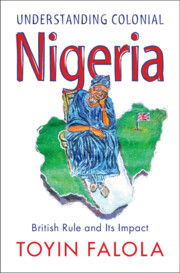Book contents
- Understanding Colonial Nigeria
- Understanding Colonial Nigeria
- Copyright page
- Dedication
- Contents
- Figures
- Maps
- Preface
- Acknowledgments
- Timeline of Events
- Part I Introduction
- Part II Conquest and Colonization
- Part III Colonial Societies
- 8 World War I and Its Aftermath
- 9 The Interwar Years
- 10 Indirect Rule and the Native Administration
- 11 The Legal System and Law Enforcement
- 12 Colonial Economy
- 13 Western Education
- 14 Social Changes
- 15 Women
- 16 Religions
- 17 Health and Medicine
- 18 Cultures
- 19 Urbanization
- 20 Creativity and Aesthetics
- Part IV Nationalism and Independence
- Part V Conclusion
- Bibliography
- Index
8 - World War I and Its Aftermath
from Part III - Colonial Societies
Published online by Cambridge University Press: 21 November 2024
- Understanding Colonial Nigeria
- Understanding Colonial Nigeria
- Copyright page
- Dedication
- Contents
- Figures
- Maps
- Preface
- Acknowledgments
- Timeline of Events
- Part I Introduction
- Part II Conquest and Colonization
- Part III Colonial Societies
- 8 World War I and Its Aftermath
- 9 The Interwar Years
- 10 Indirect Rule and the Native Administration
- 11 The Legal System and Law Enforcement
- 12 Colonial Economy
- 13 Western Education
- 14 Social Changes
- 15 Women
- 16 Religions
- 17 Health and Medicine
- 18 Cultures
- 19 Urbanization
- 20 Creativity and Aesthetics
- Part IV Nationalism and Independence
- Part V Conclusion
- Bibliography
- Index
Summary
This chapter explores the shifting dynamics between local authorities/peoples in the Niger area and the British government from 1914 to 1939. It builds upon the topics of colonial consolidation explored in Chapter 7, explaining on a macro level why the British government sought to impose these changes and exploring the impacts these changes had (social and economic). World War I and the interwar era significantly strained the British Empire, which necessitated a greater reliance upon its colonies. For Nigeria specifically, colonial officials sought to increase Nigeria’s profitability by promoting a streamlined, export-centered economy and a direct taxation system. Both of these changes required a more centralized, consolidated Nigeria, prioritizing large British firms and institutions at the expense of other foreign and local mercantile networks. Paradoxically, World War I diverted attention and critical administrative officials away from Nigeria, hampering the colony’s management and the implementation of these policies. Consequently, the colonial government relied on local draconian authorities where exploitation and improper native representation were commonplace. In response to these exploitative policies, this chapter will explain the growth of native-oriented political parties such as the NNDP
Keywords
- Type
- Chapter
- Information
- Understanding Colonial NigeriaBritish Rule and Its Impact, pp. 173 - 195Publisher: Cambridge University PressPrint publication year: 2024

